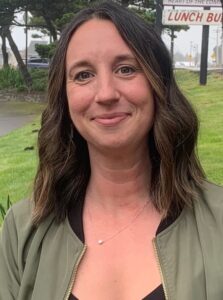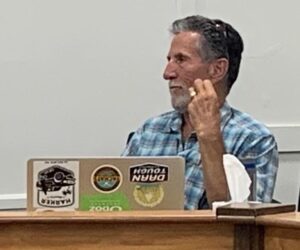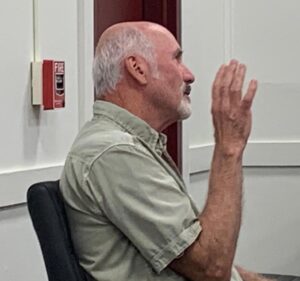
By GARRET JAROS/Lincoln Chronicle
YACHATS — To be or not to be was the question facing the Yachats Parks & Commons Commission during its monthly meeting Wednesday.
After months of frustration and questioning of its purpose, commission members put to a vote whether to continue as a commission, dissolve altogether or reimagine its role in shaping the city’s green spaces and community hub.
After an hour-and-a-half discussion and a 3-2 vote that seemingly could have gone either way, the advisory commission chose to continue on as is for the next three months while it works to streamline and re-evaluate its purview.
The five-member commission, down from its usual seven members with the departure of commission chair Meg Simans and commissioner Dan Sterling, will not hold an October meeting but continue its regular monthly meetings in November and December before again evaluating if continuing as a commission is the best choice.

“We face a pivotal decision regarding the future and structure of the commission,” city manager Bobbi Price said at the opening of the meeting. “We have two main paths before us. We can elect a chair and continue operating in our current format. Or we can explore a dynamic work group format. Those are two solid options. Or there is also discussion of maybe putting the commission on hold.”
The work group format would allow the commission to focus on specific areas such as identifying funding opportunities and prioritizing projects aligned with the city’s greater master plan, or working on codes as identified by the city council, said Price who was serving as a temporary chairwoman.
Electing a new chair and continuing on will lead to discussions about how to clarify the role of the advisory group and how it supports the work of city staff and city council, she added.
For some members, the current advisory model has felt ineffective. Commissioner Ron Simans pointed to Peace Park as an example, where a broken bench and pole remain unrepaired more than a year after the commission raised concerns.
“All they did was tear out the old bench,” Simans said. “And so to me it’s an example of (how) as an advisory board we are not doing anything.”

Simans said commission members could have fixed the bench and pole in a weekend, but because they are strictly advisory it was taken out of their hands, which is one example of the problems of continuing as a commission.
“It just seems to me this board as it is now, we’re not really making a difference,” Simans said. “We give ideas out – mostly nothing happens. And we’ve got a lot of talent here in my opinion, basically being wasted. And also, as we’ve talked about before, we are another layer of bureaucracy.”
With operations of the Commons now being handled by city staff, asking the commission for advice just adds another unnecessary cog in the wheel, he added.
Commissioner Dan Wright echoed the frustration and said he stands by his suggestion at their previous meeting that they go to a work group format.
“I think it’s a big enough umbrella for us to do everything we want to do,” Wright said. “And I think the work group has so much less bureaucracy associated with it.”
At the last meeting, it was determined that just to keep the commission going requires 12 hours of city staff time each month, he added.
“Plus, the paperwork requirements for the chairperson are apparently so onerous that nobody wants the job,” Wright said. “So it seems that if we were a work group we’d have a better focus … We’d have a lot less paperwork and be able to be more active … We can do everything the commission has done in the past in a workgroup format more efficiently.”
Others argued that dissolving the commission would come at the cost of transparency and public voice. Commissioner George Giroux warned that under a purely work group model, the city manager would decide unilaterally which projects move forward and who participates.

Former city manager Heide Lambert “put the kibosh on a work group that was working on the boardwalk with the excuse that she didn’t have any city staff to work on it,” Giroux said. “That was especially frustrating to this workgroup because they were all volunteers, showing up doing the work and no staff was needed.”
Had there been a commission, it could have appealed to the city council if a city manager was being obstructive to a work group getting things done, he added.
“I’m afraid that if this commission isn’t here, everything is just Joe Blow citizen going to either the Commons’ coordinator or the city manager asking for something and getting a yea or a nay and there’s no public exposure to that whatsoever.”
Simans interjected that any citizen or member of a work group could appeal to the council just as well as the commission could. But Giroux argued that having a commission gives more public exposure to the process. And that while it is the job of the city manager to establish who serves on a work group, the commission can suggest what projects to prioritize.
Wright reiterated the concerns he along with Simans and commissioner John Pravel expressed about the commission’s purpose.
“The frustration I have is every time we’ve gotten together, I have basically said ‘Who are we, what do we do?’ ” Wright said. “And everybody else is doing the same thing. What do we do? What do we work on? Who are we as a group? And we’re still doing that here today.
“I don’t want to change what we do,” he continued. “I want to change how we do it basically. To make it’s more responsive to what we want to see done. And have less of that paperwork that is so hard on us and the city staff.”
In eventually reaching the decision to continue as a commission, members agreed that Giroux will lead a review of Yachats’ ordinance 209 — which outlines the commission’s scope, with an eye toward updating duties that no longer fit.
The debate comes as the city council prepares to consider revisions to the city’s municipal code on Oct. 8, including clarifying the commission’s role in parks and Commons’ management.
“We’re continuing with the re-imagined scenario,” Giroux said.
Agendas will now focus more on work sessions and updates from workgroups, commissioners agreed, with less time spent grinding through paperwork, making the group both more efficient and effective.
The commission elected Adam Altson as chair and Giroux as vice chair.
- Garret Jaros covers the communities of Yachats, Waldport, south Lincoln County and natural resources issues for Lincoln Chronicle and can be reached at GJaros@YachatsNews.com




















